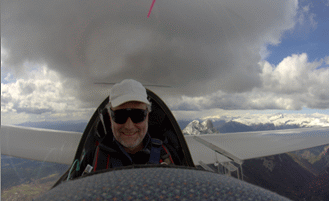by Jannes Neumann
OSTIV Prize awarded to Prof. Dr. Alfred Ultsch

The OSTIV PRIZE is awarded to:
Prof. Dr. Alfred Ultsch
for his contribution to the safety of gliding by creating the Program FLYTOP
Citation
Evaluating the statistics of flight safety in the German speaking countries of Europe - Germany, Austria and Switzerland (GAUS) with more than 30.000 glider pilots - reveals that the accident and fatality rates had stagnated at an unacceptably high level for over the two decades. It appears that improving safety primarily by investigating accidents has a natural limit. This limit was reached in glider flying in the GAUS countries in 1990-2000. The absolute number of gliding accidents in each country is so small, that the factors causing particular accident are very specific and cannot be generalized to prevent other accidents. In safety science this is a known phenomenon. Commercial airlines have overcome this limit by introducing Organizational Safety.
Organizational Safety means, that the organization responsible for flying operations implements procedures, by which it can manage its particular threads given by environmental (weather), technical (aircraft), and human factors that might develop into incidents and/or accidents.
Alfred Ultsch has delved into safety science, as previously researched by Dietrich Dörner at the University of Bamberg, Germany, who developed methods to influence complex socio-dynamic systems. Drawing on these and other methods from applied safety science in mining, chemical, and nuclear industries, Ultsch developed a training program for modern flight safety, called FLYTOP. This program focusses on the typical non-profit registered associations, the gliding clubs. Almost all gliding activities in the GAUS countries take place within these club structures.
The aim of these club trainings is to enable the implementation of pro-active management of threads and errors over each flying day. During FLYOP training the club is taught how to implement a club-based safety management. This results in typically 10 precisely defined safety projects. The inclusion of the pilot’s non-flying partners improves the sustainability of the projects. Since there is a considerable fluctuation among the club’s members and leaders, the clubs undergo refreshment training at intervals of three to four years.
Since the year 2005, more than 50 training programs for clubs have been performed in Germany and Switzerland. Organizational Safety can also be used for the improvement of safety in gliding competitions. FLYTOP therefore offers training for the organizing committee and helping personnel at competitions. Alfred Ultsch developed these trainings and established a capable team of trainers who are available on demand.
While in ICAO/EASA regulated countries safety management is mandatory for so-called service providers, i.e. flight schools or other commercial organizations, training programs in modern flight safety for clubs like FLYTOP are voluntary. Often clubs are not willing or able to organize such trainings, so one of the main objectives of FLYTOP is to teach and disseminate modern safety methods in glider flying that are based on scientifically sound principles and verified by methods of safety science.
Comments
Add a comment